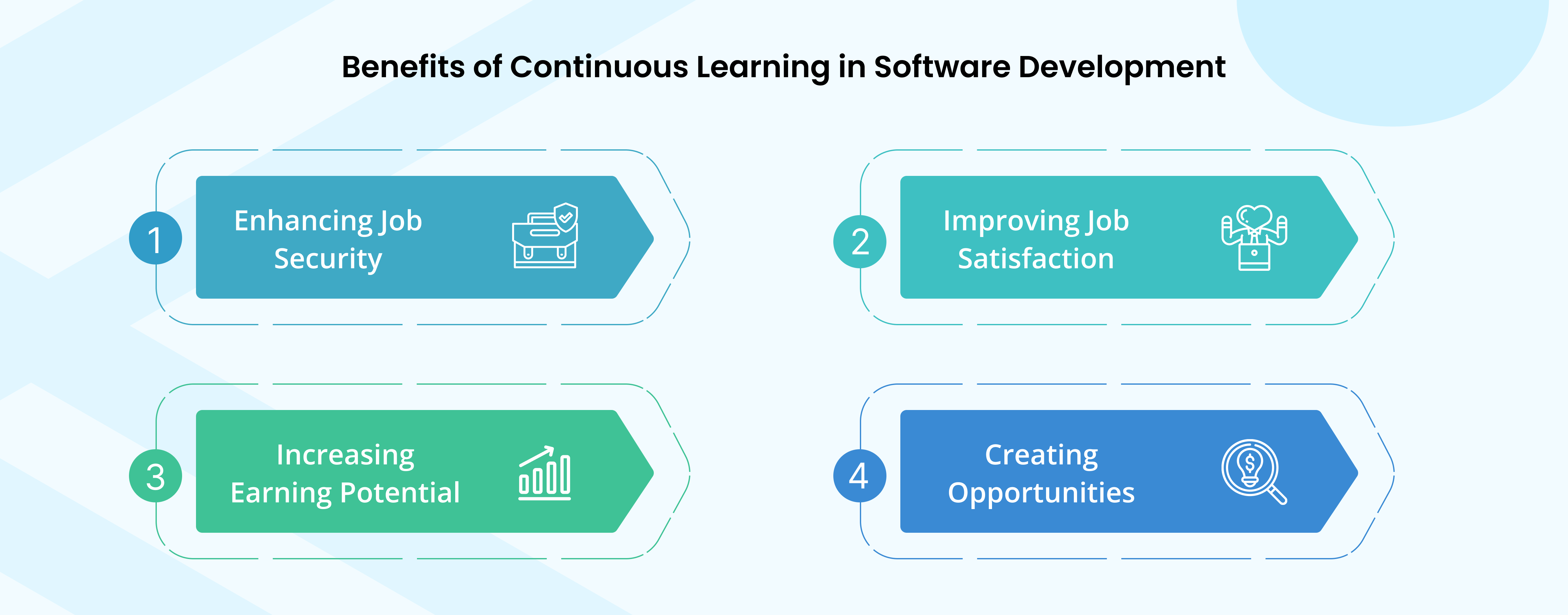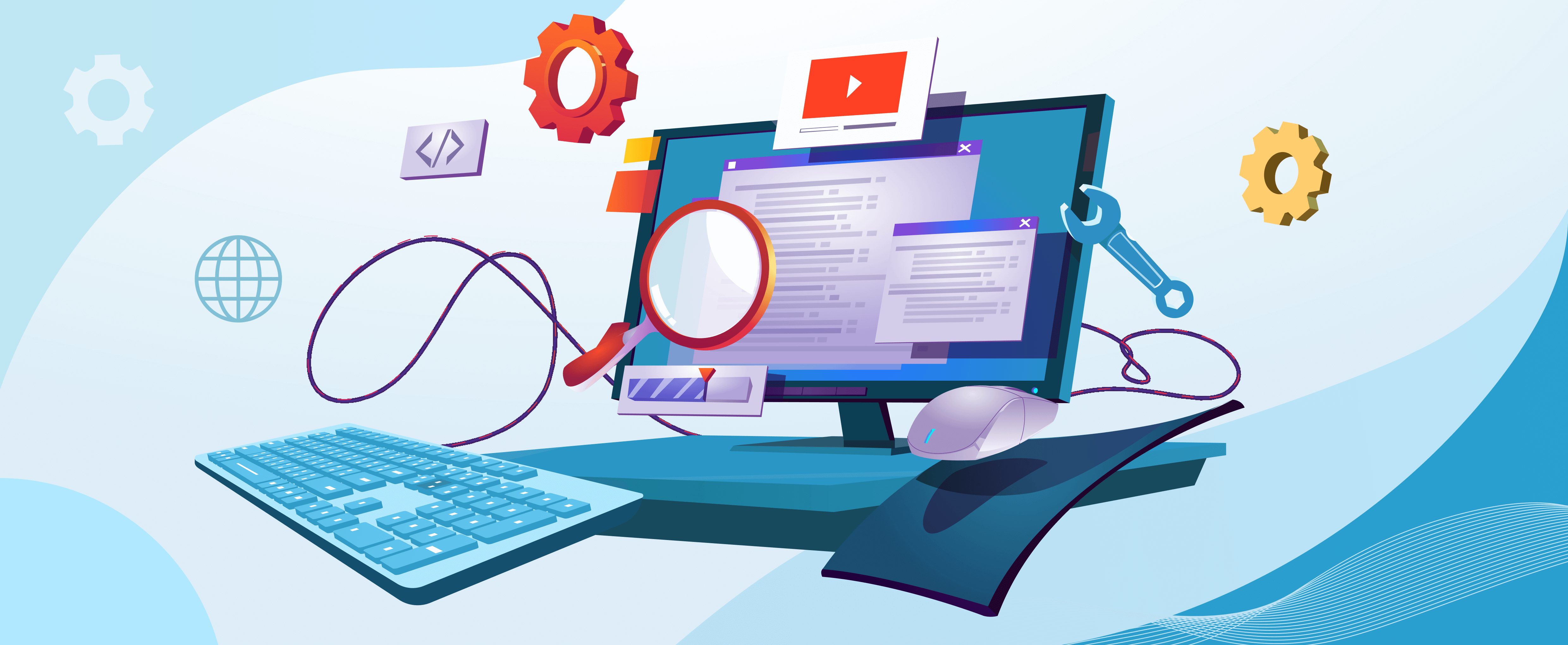
Posted by: Cloudus Infotech Pvt. Ltd.
Table Of Contents
1. Introduction
2. Why Continuous Learning is Important in Software Development
- 2.1 Staying Up-to-date with Technology
- 2.2 Improving Performance and Productivity
- 2.3 Meeting the Demands of Clients and Customers
3. Benefits of Continuous Learning in Software Development
- 3.1 Enhancing Job Security
- 3.2 Improving Job Satisfaction
- 3.3 Increasing Earning Potential
- 3.4 Creating Opportunities for Career Advancement
4. Tips for Effective Continuous Learning in Software Development
- 4.1. Setting Learning Goals
- 4.2 Taking Advantage of Online Resources
- 4.3 Attending Conferences and Networking Events
- 4.4 Collaborating with Peers
- 4.5 Practicing What You Learn
5. Challenges and Solutions for Continuous Learning in Software Development
- 5.1. Time Constraints
- 5.2 Information Overload
- 5.3 Prioritizing Learning Goals
- 5.4 Breaking Down Complex Topics
6. Tools and Resources for Continuous Learning in Software Development
7. Real-life Examples of Successful Continuous Learning in Software Development
- 7.1. Linus Torvalds
- 7.2 Bill Gates
- 7.3 Jeff Bezos
8. Conclusion
Introduction
Software development is a dynamic field that requires constant learning and adaptation to stay ahead of the curve. The importance of continuous learning in software development cannot be overstated. In this blog post, we will discuss the reasons why continuous learning is essential in software development, the benefits it provides, and practical tips and strategies for effective continuous learning.
Why Continuous Learning is Important in Software Development:
2. Improving Performance and Productivity:
Continuous learning helps software developers optimize their work processes and workflows, which can lead to better performance and productivity. By learning new skills, techniques, and best practices, software developers can create high-quality software in less time, which can improve profitability for the organization. Continuous learning also helps software developers to identify and fix errors and performance issues more quickly, which can lead to faster development cycles and more efficient use of resources.
3. Meeting the Demands of Clients and Customers:
Software development is a client-focused industry, and meeting the demands of clients and customers is essential for success. Continuous learning helps software developers stay adaptable and responsive to changing market conditions, emerging trends, and the specific business needs of clients. By gaining a better understanding of the industries and markets they serve, software developers can develop customized and tailored software solutions that meet the unique requirements of their clients and customers. This can help build strong relationships with clients and customers, which can lead to repeat business and referrals.
Benefits of Continuous Learning in Software Development:

1. Enhancing Job Security:
Continuous learning is essential in the ever-evolving field of software development. By keeping up with the latest technologies, frameworks, and methodologies, software developers can remain competitive and in demand. This helps enhance their job security and gives them an edge in the job market, even during tough economic times
2. Improving Job Satisfaction:
Learning new skills and technologies can be an exciting and rewarding experience for software developers. It can help them stay motivated, engaged, and interested in their work, leading to increased job satisfaction. This, in turn, can lead to a more positive work environment, improved productivity, and better-quality software.
3. Increasing Earning Potential:
Continuous learning can lead to higher-paying job opportunities for software developers. Employers are willing to pay a premium for individuals with advanced skills and knowledge, making it possible for software developers to earn more throughout their careers.
4. Creating Opportunities:
Software developers who continuously learn and upgrade their skills are more likely to be considered for leadership and management roles. By demonstrating their knowledge and expertise, software developers can take on more responsibility, lead projects, and become mentors to junior developers.
Tips for Effective Continuous Learning in Software Development:
1. Setting Learning Goals:
To make the most out of your continuous learning efforts, it's essential to identify your learning objectives and set specific goals. This can help you stay focused and motivated and measure your progress. Examples of learning goals could include mastering a new programming language, learning a specific framework, or gaining expertise in a particular domain.
2. Taking Advantage of Online Resources:
There are many online resources available that can help you learn new skills and technologies. These include e-learning platforms, coding boot camps, online courses, and tutorials. Online resources are often self-paced and flexible, making them a convenient option for busy software developers.

3. Attending Conferences and Networking Events:
Conferences and networking events provide opportunities to learn from industry experts and network with other professionals. They can be a great way to stay up-to-date with the latest trends, technologies, and best practices. Conferences and events also offer opportunities to meet potential mentors, collaborators, or employers.
5. Practicing What You Learn:
To solidify your understanding and improve your performance, it's important to apply your new skills and knowledge to real-world projects. This can help you identify areas for improvement, gain experience, and build a portfolio of work. Practicing what you learn can also help you stay motivated and engaged in your continuous learning efforts.
Challenges and Solutions for Continuous Learning in Software Development:

1. Time Constraints:
One of the biggest challenges for continuous learning in software development is finding the time to do it. To overcome this, prioritize your learning goals and allocate dedicated time for learning each day or week. This could involve setting aside specific hours in your schedule, reducing time spent on non-essential activities, or even taking advantage of commute time for learning.
2. Information Overload:
With the abundance of information available online, it can be overwhelming to decide what to learn and where to start. To overcome this, set clear learning objectives and focus on specific topics or technologies. This could involve conducting research to identify trusted sources of information, joining online communities, or seeking guidance from mentors or peers.
3. Prioritizing Learning Goals:
Software developers face numerous learning opportunities but may struggle with balancing competing learning goals. To overcome this, evaluate your career aspirations and choose learning goals that align with them. Prioritize learning goals that will help you develop in-demand skills or increase your knowledge in areas that interest you.
4. Breaking Down Complex Topics:
Some software development topics can be complex and challenging to understand. To overcome this, break down complex topics into smaller, more manageable pieces and focus on mastering one piece at a time. This could involve seeking out tutorials, working through practice exercises, or collaborating with peers to better understand challenging concepts.
Tools and Resources for Continuous Learning in Software Development:
1. Online Courses and Tutorials:
Online courses and tutorials offer a flexible and self-paced way to learn new skills and technologies. These courses are typically designed by experts in the field and provide comprehensive and structured learning material. Many online learning platforms offer certifications that can help you demonstrate your skills to potential employers. There are many online learning platforms, such as Udemy, Coursera, and Pluralsight, that offer courses and tutorials on various topics and technologies.
2. Webinars and Workshops:
Webinars and workshops are live events that allow you to interact with industry experts and peers in real time. These events provide opportunities to ask questions, get feedback, and learn about the latest trends and developments in the field. Webinars and workshops provide opportunities to learn from industry experts and interact with peers.
3. Books and Blogs:
Books and blogs are other great resources for continuous learning in software development. They provide in-depth knowledge and insights into specific topics and can be a great way to learn at your own pace. Many authors of these resources are industry experts who share their real-world experiences and insights into best practices. Additionally, blogs can also provide timely updates on new technologies and trends in the field.
Real-life Examples of Successful Continuous Learning in Software Development:
1. Linus Torvalds:
Linus Torvalds is a Finnish-American software engineer who is best known for creating the Linux operating system. Torvalds is a firm believer in the importance of continuous learning, and he has always been keen to explore new technologies and programming languages. For example, he developed the Git version control system in 2005, which has become the industry standard for software development. Torvalds has also been known to experiment with new programming languages, such as Rust and Go, and he has been involved in several open-source software projects.
2. Bill Gates:
Bill Gates is a well-known figure in the software development industry, having co-founded Microsoft, one of the world's largest software companies. Gates has always been a strong advocate for continuous learning and staying up-to-date with the latest technologies. He is known for his passion for reading and has been quoted as saying that he reads about 50 books per year. Gates also regularly attend industry conferences and events, where he can learn from other experts in the field.
3. Jeff Bezos:
Jeff Bezos is the founder of Amazon, one of the world's largest e-commerce and cloud computing companies. Bezos is a firm believer in innovation and continuous learning, and he has always been committed to staying ahead of the curve when it comes to new technologies and trends. Bezos has been known to encourage his employees to experiment and take risks. He has invested heavily in research and development to keep Amazon at the forefront of the industry. Bezos has also been involved in a number of other ventures, such as Blue Origin, which focuses on space exploration and technology.
Conclusion
Continuous learning is essential for success in software development. It helps software developers stay up-to-date with the latest technologies, improve their performance and productivity, meet the demands of clients and customers, and create opportunities for career advancement. By setting clear learning goals, taking advantage of online resources, attending conferences and networking events, collaborating with peers, and practicing what you learn, you can enhance your continuous learning experience and achieve success in your career.
